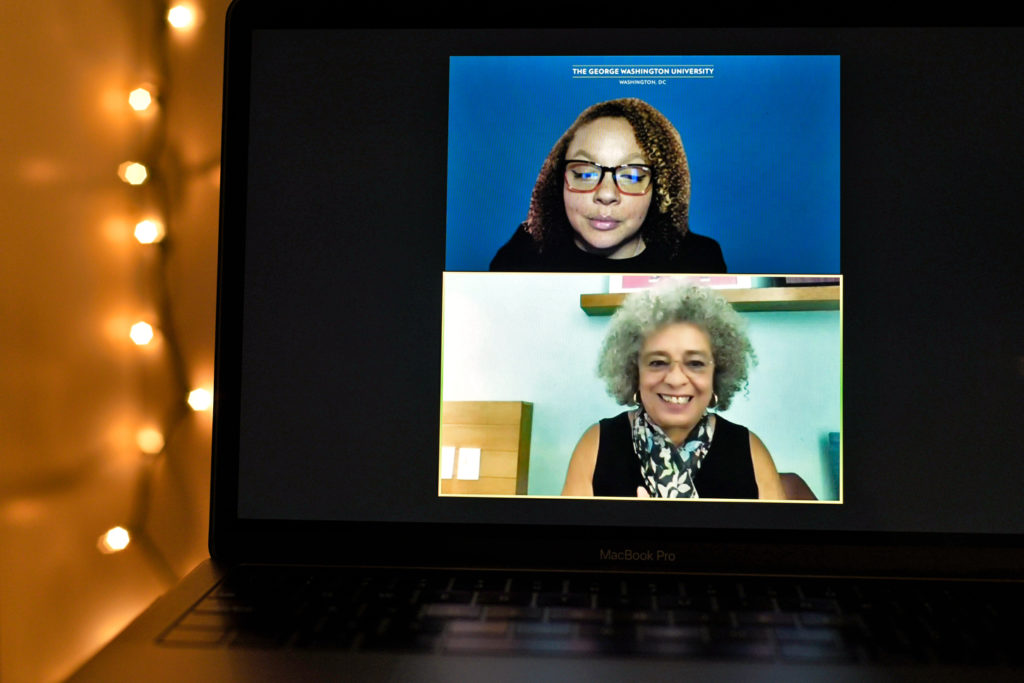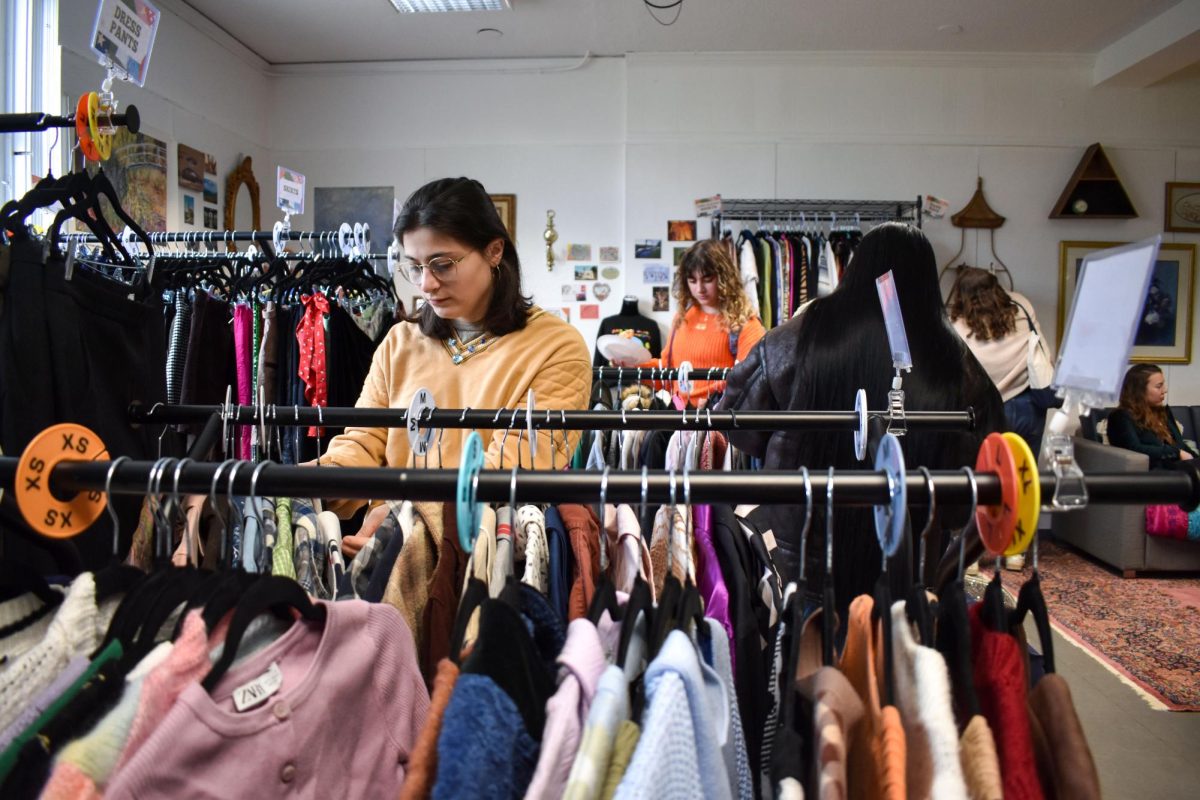The Office for Diversity, Equity and Community Engagement hosted the seventh annual Diversity Summit late last week, featuring more than 20 virtual sessions including a keynote address from Angela Davis.
Nearly 40 speakers including students, scholars and activists participated in the virtual summit Thursday and Friday, headlined by the theme “The Audacity of Hope, The Power in Community,” which sought to educate the University community to protect diverse identities and enhance racial equity across the country. The summit’s lineup featured distinguished civil rights activist Angela Davis who delivered the keynote address, speakers from GW and honorary guests Dr. Tony Keith and Rebecca Russo, who discussed issues ranging from policing’s effect on D.C. youth to the intersection between sexual violence and disability.
Davis rehashed her journey of advocacy from the Civil Rights Movement to modern-day racial justice issues, like prison abolition and intersectional discrimination and advocacy, during her address Thursday.
She said she has spent her career writing eight books about social justice issues and lecturing about civil rights throughout the United States, Europe, Africa, Australia and South America. She said as a child growing up in the Jim Crow south, she developed a life centered around resistance from a young age, recalling a game where her friends would dare each other to ring white people’s doorbells before running away.
“We even turned resistance into a game.” Davis said at the summit. “But most importantly, it became a way of life. It became the way in which we live our lives.”
Davis said Black feminists have faced an intersectionality of discrimination on the basis of race, gender and sexuality, evidence of how multiple identities have conceptualized “our place in the world.”
“Intersectionality is a particular formulation of the kind of interconnectedness and interrelatedness that Black feminists have been arguing for for a very long time,” she said.
Davis voiced her support for the prison abolition movement at the summit, saying that without prisons, people would be free to live their lives without the fear of oppression and harm.
“A world that would no longer need prisons and police for security would be a world in which people were happy and free and were able to explore their own individual desires and passions.” Davis said. “It would be a socialist world, let me put it that way.”
She said everyone comes from a community, which in turn will shape their individual personality, tying into this year’s theme invoking the power in community identities, relationships and voices.
“We are all produced by communities, we would not exist as individuals if not for our communities.” she said.
Other speakers at the Diversity Summit discussed antisemitism, critical race theory and health concerns related to racial trauma as issues that affect community diversity.
Sabrina Soffer, a freshman majoring in international politics and Judaic studies and an opinions writer for The Hatchet, spoke at an event about antisemitism and Jewish inclusion on campus Thursday, where she advocated for an increase in Holocaust education and more awareness about a recent rise in antisemitism across college campuses.
Antisemitism resurfaced as a campus-wide discussion at GW after a Torah was desecrated at Tau Kappa Epsilon’s townhouse earlier this month, drawing hundreds of students to voice their support for the Jewish student population.
“We have to remember history in order to prevent what’s going on, especially because GW has a one-third Jewish population, but yet we have the second most cases of antisemitism across colleges in the nation.” Soffer said in an interview.
Following Russo’s presentation, a panel of faculty and administrators answered questions and explained available resources, like bias reporting, to address concerns about antisemitism at GW. Caroline Laguerre-Brown, the vice provost for diversity equity and community engagement, said on the panel that officials have a mission to build a more inclusive GW through these resources.
In response to a question from the audience regarding the summit’s theme of hope, Laguerre-Brown said that in the face of rising antisemitism, she finds hope in the GW student community.
“As the head of the Office for Diversity, Equity and Community Engagement, to be sure, the mission of the office is really every single day to work on as many fronts as we can to try to build a more inclusive GW,” she said.
Wendy Ellis, an assistant professor of global health and the director of the Center for Community Resilience in the Milken Institute School of Public Health, spoke during the closing event entitled “Trauma, Equity and Resilience: A Call to Action.” The discussion focused on trauma created by forms of systemic racism, like inequitable economic opportunity, social capital and housing affordability, which have oppressed and marginalized communities.
“When we hear community narratives, are we merely just looking at the outcome, or are we asking ourselves, ‘Is this also the experience of racism that we are seeing?’” she said at the event.
Ellis said community resilience is essential to break from cycles of trauma. Recounting her own childhood experiences with an abusive father who murdered her mother, Ellis said the resilience of her community and the availability of an education propelled her to where she is today.
“We know what equity means, we know what diversity looks like and we know the importance of inclusion,” she said. “So let’s get to work.”
Interim Provost Chris Bracey delivered a presentation about critical race theory, its origins and its inclusion in public school history curricula at an event Friday. Bracey said critical race theory originated in the legal field, and that the term acts as a verb in describing “one who engages in critical race theory” to learn more about the role of race and racism in society.
He said “critical race theorists” are examining how a rule, law or decision may disadvantage people of color.
Bracey said conservatives have worked to oppose critical race theory and its inclusion in public school history curricula, fearing it may negatively portray white people.
“Critical race theory seems to have risen from relative obscurity to front page news almost overnight,” Bracey said at the summit.
He said this resistance has driven the growing attention toward critical race theory, but these conservative opponents who “have no clue” about the true meaning of the term are actually opposing the rise of multiculturalism.
“This is what the masses are reacting to – this prevailing perception that somehow critical race theory is threatening white privilege,” Bracey said.








